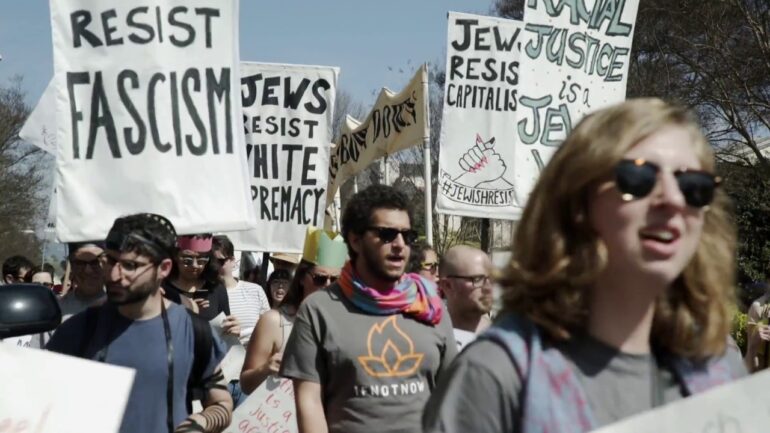A recent piece in The Forward written by Etan Nechin criticized Diaspora Jewish activists on the left who draw inspiration from their Jewishness for their activism, claiming that these Jews center themselves in struggles for others (and in doing so erase the very people they are trying to help).
Other than the fact that Nechin erroneously tries to reduce Jewish identity to the category of religion, his overall argument is problematic because there actually is something deeply Jewish about what these activists do and they should be encouraged to recognize, embrace and further explore that.
For thousands of years, Israel’s sages have been teaching that deep within the Jewish people’s collective psyche is a drive to liberate all of mankind. We are meant to participate with the Creator in establishing a just world that fosters harmony between peoples and cultures, and will ultimately bring all of humanity to experience ourselves as part of one inclusive organic Whole.
For centuries, Jews have disproportionately participated in revolutionary movements for justice and social change. With Karl Marx being the clearest and most obvious example, Hebrew thinkers and organizers have had a tremendous impact on struggles to make the world a better place. The histories of Jewish exiles in the West are clearly interrelated with the histories of progressive and anti-fascist movements.
Even at times when our own oppression became so intense that the conscious focus of many revolutionary Jews shifted to the liberation of our own people, the deeper thinking and more far-sighted Jewish sages understood our particularist national movements as merely a stage meant to create a stronger vehicle for the Children of Israel to positively impact humankind on an international scale. According to the worldview and meta-narrative of the ancient Hebrews, even Jewish nationalism is meant for the purpose of a universal goal.
Nechin’s overall tone and point of concern is revealed in one very telling paragraph.
Even more surprising is the fact that young Jews portray the pursuit of justice for the Palestinians through a decidedly Jewish lens. Their materials and their members are steeped in what they view as the Jewishness of this struggle, something they share with the right whom they seek to replace. This choice is not inconsequential. For embedded in the language they have developed to do the crucial work of opposing the occupation is the appropriation of the Israeli-Palestinian conflict as an avatar for their own unformed identities, and the erasure of the very people they are trying to help.
Nechin’s criticism was specifically directed at two Jewish organizations – J Street and IfNotNow – that challenge American Jewish support for what they both refer to as “the occupation.” Nechin’s critique is perhaps more fitting for the former than for the latter, as the Liberal Zionists of J Street narrowly define “the occupation” in much the same way as Western governments and ruling class Israelis – namely Jewish control over the West Bank.
As such, J Street is in fact guilty of superimposing its own struggle (to make the State of Israel an American-backed Rhodesia-esque outpost of Western civilization in pre-1967 borders) on Palestinians. The Liberal Zionist lobby truly seems to use the Palestinian cause as merely a tool to achieve the “two-state solution” they hope will save their vision for what Israel should be.
IfNotNow, by contrast, allows space for multiple definitions of occupation, including those inclusive of Palestinian experiences. Unlike J Street, which merely attempts to increase support for a specific policy, INN appears genuinely interested in addressing Palestinian grievances. And unlike J Street, which is decidedly Liberal Zionist, INN creates wider space for Zionists, non-Zionists, anti-Zionists, pro-BDS, anti-BDS, two-staters and one-staters. Definitions of occupation can range from that of the international community to that of Palestinians suffering underneath it. So while Nechin’s criticism might fit J Street, Diaspora Liberal Zionists and even the Israeli left he himself hails from, it would be wrong to paint INN with the same brush.
What lies at the root of Nechin’s problem is that he represents a mindset that did away with Jewish identity in favor of a Western liberalism that demands conformity and the dilution of unique identities. The search by progressive Diaspora Jews for meaningful Jewish connection alarms him because – like much of Israel’s westernized elites – he’s already rejected what little of his people’s identity he was exposed to.
To a certain extent, Jews fighting for Palestinians can’t not make their struggles about themselves because it is about us – especially in-so-far as Palestinian and Jewish liberation have become so intertwined. Palestinians are very much victims of a Jewish identity crisis and Israelis have been pushed into the anti-Semitic “middle agent oppressor” role systemic to the capitalist system. Liberation for one people therefore requires the liberation of the other.
At a time when Diaspora Jews on the left are having real conversations about bringing their full selves to movements for social change, Nechin’s piece aims to shame them into denying their own identities and interests in fighting the occupation. It attempts to make Jews self-conscious about centering themselves and their identities in their activism and therefore aims to make them downplay the role their Jewishness plays in their activism.
Jews showing up to Palestinian solidarity work as “privileged white allies” with no actual skin in the game can never make real change because it ignores basic realities lying at the heart of the conflict. The occupation groups like INN oppose is largely the result of a Jewish identity crisis and the only way these activists can truly challenge it is to meaningfully confront their own identities. Anything that causes them to feel self-conscious about “making it about them” prevents them from exploring the necessary questions they need to be asking themselves in order to succeed.





